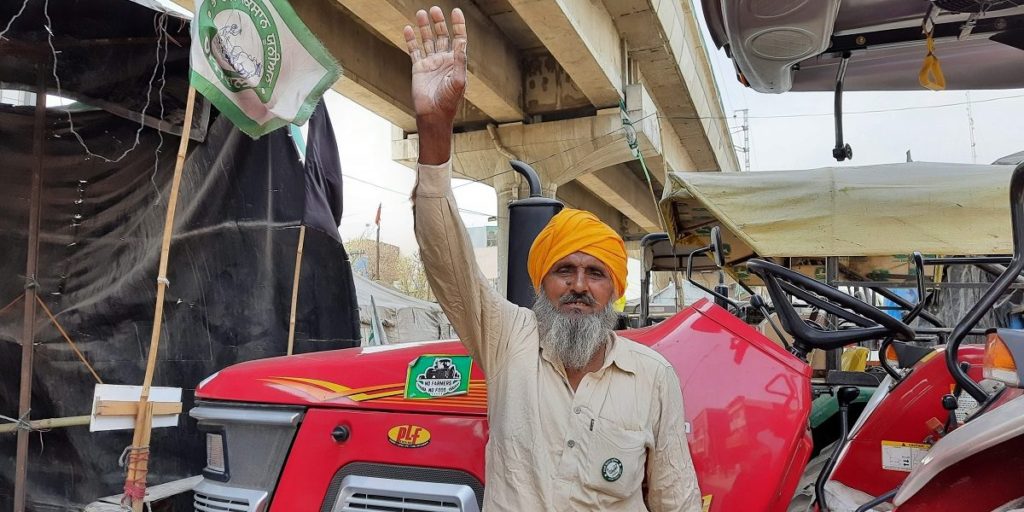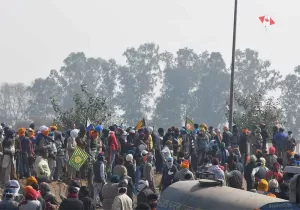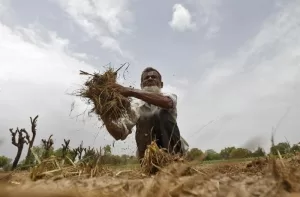If I don’t spend at least a day or two every week in the company of the farmers at the Tikri border, I start feeling restless. In Prime Minister Narendra Modi’s scheme of things, that would probably qualify me as an andolanjivi (professional protester) or a parjivi (parasite). Personally, I much prefer ‘kisan samarthak’ (friend and supporter of the farmers.)
Tikri is not a picturesque spot, nor is it easy to get to, so why the deep, visceral need to keep visiting it? Having thought about it long and hard, I have come up with six reasons. These reasons are, in fact, six attributes that this protest has come to exemplify. Like the prime minister, I too have put them in an acronym – F.A.R.M.E.R.
F – Fearlessness
A – Assertion
R – Resolve
M – Morality
E – Empathy
R – Righteousness
Fearlessness: The fear of speaking out against the powers-that-be hangs like a pall over much of middle and upper class India. This fear is non-existent at the protest sites. Ravish Kumar in his book, The Free Voice, said:
“A powerful fear is created over maniacal debates on TV channels. Many news anchors swarm like fearsome attackers all over those who ask questions. The common viewer of TV channels sees … what becomes of those who raise questions. So he stays quiet, and by his silence he becomes a part of the mob. Fear has seeped into people’s consciousness.”
But just as fear is contagious, so is fearlessness. If you wish to walk in a place ‘where the mind is without fear and the head is held high, where the world has not been broken up into fragments by narrow domestic walls, where words come out from the depth of truth, and where the clear stream of reason has not lost its way into the dreary desert sand of dead habit’, I would suggest Tikri border (or Singhu, Ghazipur or Shahjahanpur). Being in the company of those who are unafraid releases you from your own fear.
As a young activist camped at Tikri border told me matter-of-factly over a cup of tea, “I love life and the good things in life, and I have no desire to be a martyr. But if standing with the farmers means I end up losing my life (which I sincerely hope doesn’t happen), then it is a price I am willing to pay.”
Those were not idle words. This activist has been living on the road with the farmers and other activists for the past four months, and meant what she said.
Assertion: The Indian farmer is refusing to be marginalised any more. Shockingly, over 3.6 lakh Indian farmers have died by suicide since 1995 because of the distressed state of Indian agriculture. This works out to an average of 38 farmer suicides every single day for the last 26 years! Imagine if 38 lawyers, doctors or chartered accountants were to died by suicide every day. Panic would spread across the length and breadth of the land. But for decades now, the plight of the Indian farmer has gone largely unreported.
Now, at long last, the Indian farmer is asserting himself, and as he does, others are beginning to assert themselves, too.
Resolve: Around the middle of March, I asked a group of farmers from Raguana village in Haryana’s Sirsa district how long they were planning to stay on at Tikri.
“Chaubees tak (Till 24),” they answered.
I asked them, “Chaubees tareek tak (Till the 24th)?”
Giving me a slightly irritated look, they replied, “2024 tak (Till the year 2024).”
“Abhi tak toh mela thha (It was a carnival up until now),” they tell me. “Asli aandolan toh ab shuru hua hai (The real protest has only just begun).”
They told me their village has already prepared a roster for the next seven to ten months of farmers who will come to stay at Tikri ten days at a time. Since the onset of summer, many farmers have started constructing bamboo abodes with high roofs, ceiling fans and coolers at Delhi’s borders. Some have even fenced their new ‘houses’ in with bamboo and decorated them with potted plants.
Morality: At the heart of the farmers’ protest is something that has become conspicuous by its absence in Indian polity over the last seven years – morality. (Defined here as ‘the clear distinction between right and wrong and good and bad behaviour’.)
Mahatma Gandhi once said, “The very essence of our civilisation is that we give a paramount place to morality in all our affairs, public or private.” How far from that ideal have we fallen?
At a time when the purchase of MLAs has become commonplace, the toppling of democratically elected state governments acceptable, the funding of India’s largest political party more opaque than ever, and the harassment of truth-telling journalists and comedians routine, it is refreshing to see the Kisan Ekta Morcha’s clear, moral and unambiguous stand on the three objectionable farm laws. Their refusal to accept anything less than a complete repeal seems to have flummoxed the BJP. Here is a stratum of Indian society that is simply refusing to be bribed, bought or browbeaten. This is a new phenomenon and the government does not know what to do about it.
Empathy: I will never forget the day I met a group of farmers from Kannur in Kerala camped at the Shahjahanpur border. When I asked them what had prompted them to travel all the way to the Haryana-Rajasthan border, one of them by the name of Sadanand said, “We don’t have any problem. We get a good price for fourteen crops in Kerala. We are here to express our solidarity with the farmers of north India who are suffering.”
Another farmer, Muralidharan Karivellur, added, “We live in good houses in Kerala but we are willing to stay here in a tent on Delhi-Jaipur highway with our brothers from Rajasthan, Haryana and Madhya Pradesh. If I am to call myself a human being, then your problem needs to become my problem.”
Righteousness: The dictionary defines righteousness as “acting in accordance with moral law” and more interestingly, “arising from an outraged sense of justice.” One is reminded of a verse from the Sermon on the Mount in the New Testament: “Blessed are those who hunger and thirst for righteousness, for they shall be filled.” (Matthew 5: 6)
The farmers’ protest is slaking a deep thirst in our souls for righteousness. It is reminding us that the human virtues that make a society worth living in are very much alive. For that reason alone, it should behove those of us who can to make at least one visit to any of the borders of Delhi where the farmers are camped. Once you do that, chances are you will go back again and again.
In a dark time, after all, it is difficult to stay away from the light.
(Rohit Kumar is an educator with a background in positive psychology and psychometrics. Courtesy: Wire.in.)




